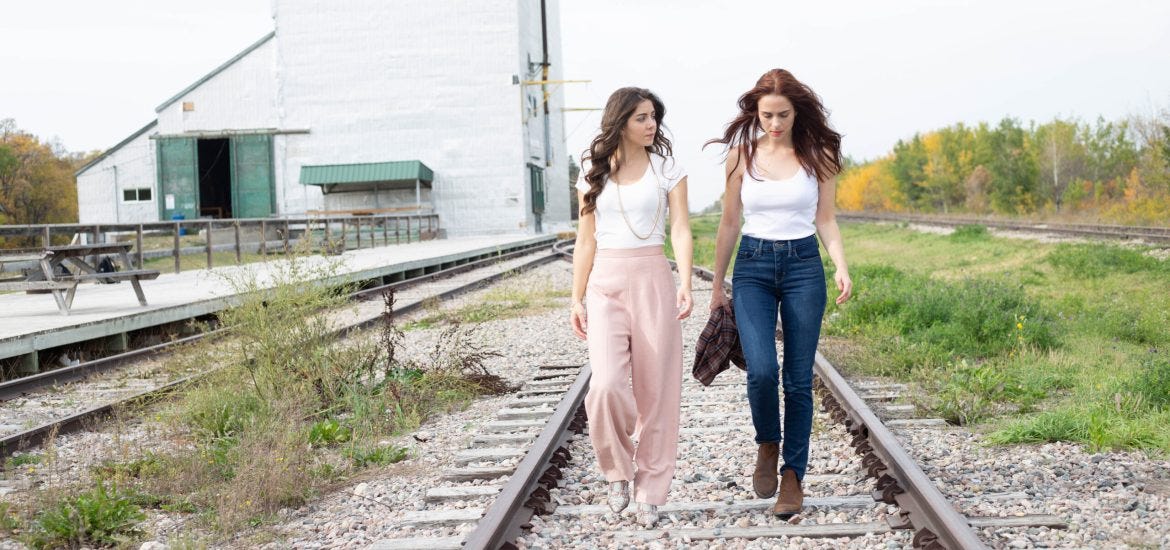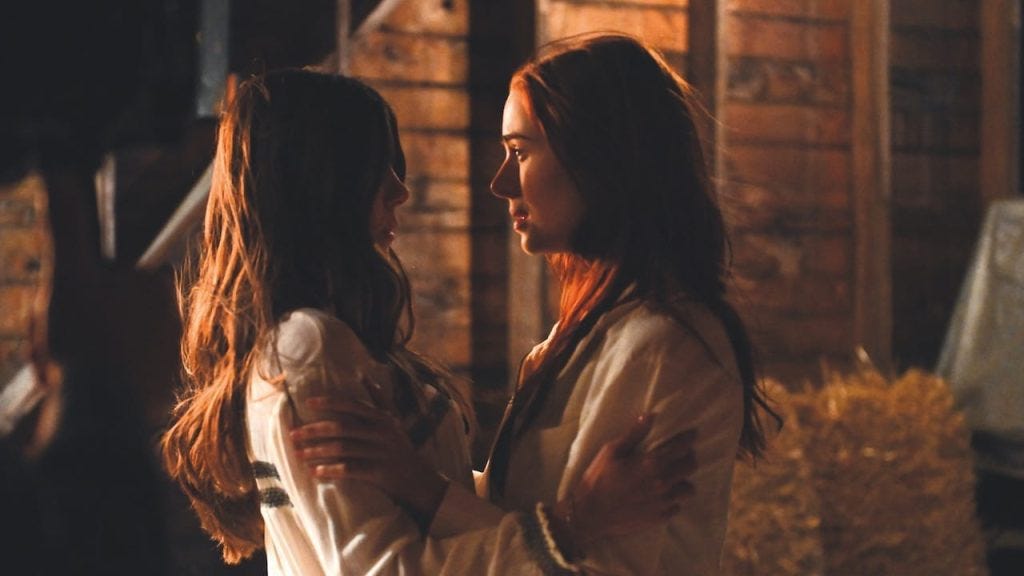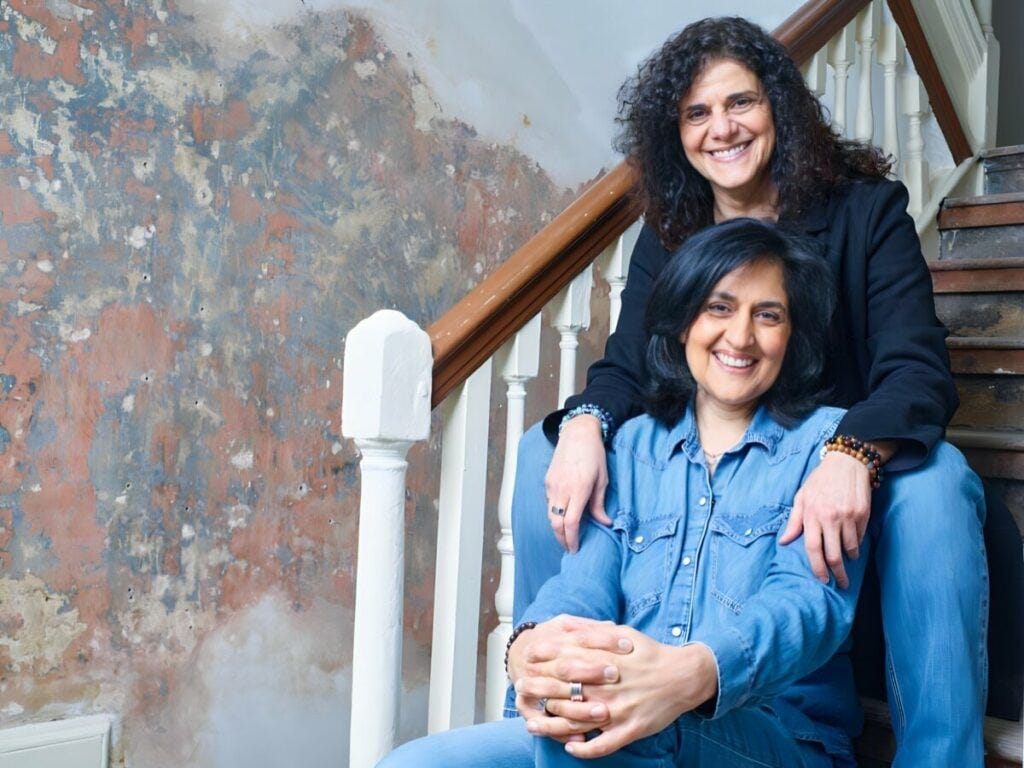On 'Polarized,' a Lesbian Film About Unity and Tolerance
Shamim Sarif's new film is now available to watch in the U.S.
This is the Sunday Edition of Paging Dr. Lesbian. If you like this type of thing, subscribe, and share it with your friends. Upgrade your subscription for more, including weekly dispatches from the lesbian internet, monthly playlists, and a free sticker.
The newest film from British director Shamim Sarif was released in the United States last week, though you’d hardly know that from the lack of press it has received. Sarif is best known for her two previous lesbian films, I Can’t Think Straight and The World Unseen, both of which star actors Lisa Ray and Sheetal Sheth. These two earlier films tell cross-cultural love stories and depict women fighting against society’s expectations, and as the film’s title suggests, Polarized is no different.
Polarized takes place in a new setting – Canada – and features two new actors. Maxine Denis plays Dalia, a Palestinian woman who, along with her family, runs a high-tech urban farm in small-town Manitoba. Having lost her family farm and struggling to take care of her ailing father, Lisa (Holly Deveaux) starts working at Dalia’s farm despite believing it’s responsible for her economic hardships. The many differences between the two women – differences in class, race, religion, and country of origin, as well as two opposing schools of thought about farming – put them at odds with one another.
Sarif sets up the conflict right away. While sitting in a cafe, Dalia’s family sees a big, loud truck drive by and calls them “rednecks.” Lisa’s prejudices are significantly worse. During their first scene together, Lisa makes some xenophobic and racist remarks, suggesting that Dalia and her family don’t belong in Canada. Dalia rightly fires her over the outburst, and we’re off to the races.
The film makes many equivalencies between the two women, though not all of them feel warranted. When Lisa explains to Dalia how her family lost her farm (and that she blames Dalia for it), Dalia shares that her family lost their farm in Palestine as well – because the water was diverted and there was nothing they could do about it. (Notably, Dalia does not share who diverted their water or why they did so.) There are certainly differences between losing your land because you live under apartheid and settler colonialism and losing your farm because of economic reasons, though climate change is a throughline. Later, they both share that their families expect them to settle down and have kids, though Lisa’s relationship with Christianity takes precedence over any depiction of Dalia’s Islamic traditions.
Driving home the question of difference, a significant portion of the film is spent illustrating how inhospitable the town is to Dalia and her family. Lisa is the first one to treat them poorly, though she’s not as bad as her brother, a cop who constantly harasses the owner of a Palestinian cafe. Lisa’s mother dislikes “the Arabs” as well, and the family priest tries to convert them to Christianity.
Lisa’s struggles are more inward-focused. She is devastated by the loss of her family farm and the fact that they have to live in a small mobile home. Her father is dying of cancer, and her mother is coping by becoming even more devout. It’s unclear if we’re meant to think of these hardships as an excuse for Lisa’s casual racism, but we do get a sense that a lot is going on in both these women’s lives.
After their initial prickly meeting, Lisa and Dalia grow close. Dalia realizes that Lisa cares deeply about her family and their legacy and that she’s a talented singer-songwriter (this latter is clearly a turn-on for her), while Lisa finds that Dalia’s not the stuck-up rich girl she assumed her to be. They eventually kiss, but things don’t progress because Dalis is engaged to her childhood best friend. Meanwhile, Lisa has known she’s gay for quite some time, but has never acted on it, presumably because of the evangelical Christian culture she was raised in. They go on a road trip that is interrupted by Dalia’s fiancé, but not before Dalia gets hot and bothered watching Lisa change a tire.
As happens in most romances, Dalia and Lisa are torn apart in the third act. Dalia’s family buys Lisa’s farm – one of several plot points that make the film feel Hallmark-adjacent – and Lisa is furious. Meanwhile, Lisa’s family and friends correctly surmise her feelings for Dalia and force her into a shockingly violent and harrowing intervention at the church. Dalia’s family also reacts poorly to the revelation about her feelings for Lisa, and her dad kicks her out of the company and the house. They come back together, of course, as Sarif is committed to the ethos of a happy ending.
Though it has its moments, one of the downfalls of the film is how much time is spent on characters besides Dalia and Lisa. The equally traditional parents feel like caricatures at times and fail to give us much insight into the inner worlds of our leads. Lisa’s racist cop brother adds little to the story and is certainly not an indictment of cops overall, as his partner is shown to be “one of the good guys.” The film touches on many issues but doesn’t have time to delve into any of them deeply enough.
Polarized’s saving grace is its two lead actors, who do an admirable job with the material and thankfully, have good chemistry. Indeed, the portions of the film where they’re not together – such as the final third – suffer because of this absence. Ultimately, the film presents us with an easily digestible moral – that people can (and should) overcome their differences and come together in friendship and in love. The Palestinian baker eventually forgives the cop for his behavior – though he has not earned this forgiveness – and even gives him a gift, illustrating the movie’s faith in tolerance as the key to harmony.
If you’re looking for a film that offers up a biting, truly thought-provoking political critique, it’s best to look elsewhere. Sarif describes the film’s liberal fantasy like this: “I wanted to tell a story that could get us past those superficial differences that politicians are very happy to tell us should be keeping us apart”. She also compares Polarized to Three Billboards Outside Ebbing, Missouri, a film which, despite awards acclaim, has also been panned for saying almost nothing about American politics or society. To give Sarif credit, Polarized does clearly articulate its intentions, even if the themes therein are drawn with a heavy hand.
Polarized has many similarities to Sarif’s previous films, though the director has transported her ideas into a new context. There is less romance in Polarized than in I Can’t Think Straight, and even more social discord. (I Can’t Think Straight centers on a Palestinian Christian and an Indian Muslim.) The World Unseen takes place in 1950s South Africa (where Sarif’s family used to live) and also depicts women struggling to contend with restrictive social norms. The issues tackled in Polarized are not as insurmountable as those in The World Unseen, but it lacks the comedic, joyful tone of I Can’t Think Straight.
Still, it’s not necessary to write the film off completely. Sarif’s wife and producer, Hanan Kattan, a Jordan-born Christian Palestinian (like Tala in I Can’t Think Straight), highlights the importance of Palestinian representation in film. “It’s one of the few times in cinema that we see Palestinian immigrants onscreen who are successful, driving scientific innovation, and in the case of Dalia, also queer,” she notes. To her point, it is significant that one of the leads in a (semi) romantic film is Palestinian and exists alongside several other Palestinian characters.
Of course, the specifics of what it means to be a Palestinian immigrant in Canada aren’t really touched upon beyond the broadly racist interactions they have with other townsfolk. Dalia markedly does not mention that her family lost their farm because of Israel’s violent seizure of their ancestral land. Sadly, this lack of more pointed political statements or timely connotations probably helped the filmmakers in their distribution efforts. Palestinian films remain controversial, more so since Israel’s genocidal campaign in Gaza intensified a year and a half ago. American companies have refused to distribute No Other Land, a powerful documentary depicting Israel’s destruction of the West Bank, though it received distribution in 24 other countries.
To be fair, Polarized is a very different film from No Other Land, and there is little overlap between the ultimate message of these films or the means by which they get these messages across. As a piece of entertainment, it’s hard to say that Polarized is strictly good or bad, just that it now exists in the world, for better or for worse. One hopes it falls decisively on the side of good.





